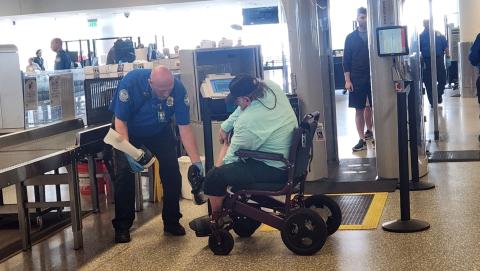From there his experience got even worse. Without his own wheelchair, Carter had to sit in a regular chair, which caused him a lot of pain. The pain was so great that he was forced to leave the meeting and missed any opportunity to speak. Back at the hotel, the airline finally delivered his chair, but it was roughly patched together with sellotape.
A quick and inadequate “fix” allowed Carter and his family to see some of Denver's sights, but the experience left him disillusioned with future air travel. “The idea of flying again is not something I would want to do because there is no recourse for the actions of the airlines.”
Importantly, the new rules make airlines liable for mishandling wheelchairs, which is an automatic violation of the rules. Air Carrier Access Act. This important measure allows the DOT to impose fines of up to $100,000 per incident and ensures that airlines prioritize the proper management and handling of essential mobility equipment.
When considering what airlines can do better, Carter said they should “stow these chairs better” and “better train people on how to handle these chairs, which are extensions of our bodies.” said that it can be done. Both of these improvements are included in the new rules.
An estimated 5.5 million Americans rely on wheelchairs, and air travel challenges have long been a barrier to accessibility. Especially for the ALS community, the fear of a wheelchair breaking or being mishandled adds even more unnecessary stress. Many people with ALS rely on air travel to access important medical appointments. Certified ALS Clinic or to Participate in a clinical trial.
No one should have to endure pain, fear, weakness, and missed opportunities while simply trying to reach a destination by plane.
Reducing the burden of air travel will alleviate some of the challenges faced by people living with ALS and their families and ensure equitable access to needed health care and treatment.
All people have the right to be treated with dignity and respect, regardless of their migration status. This new regulation means that all disabled people who rely on a wheelchair for mobility, including those with ALS, can now travel safely and confidently for medical, business, leisure and other reasons.
Join us for our upcoming webinar on April 23, 2024. Join our community to learn more about the challenges people with ALS encounter while traveling by air, what the federal government is proposing to make air travel more accessible for everyone, and how you can influence the Department of Transportation. Let's discuss. Please take action!
Register here
Share your flying nightmare with us here by Thursday, May 9th. We will deliver it directly to the DOT on your behalf.
To keep up with the stories of people living with ALS in your area and learn more about the disease, follow our blog here.
subscribe


